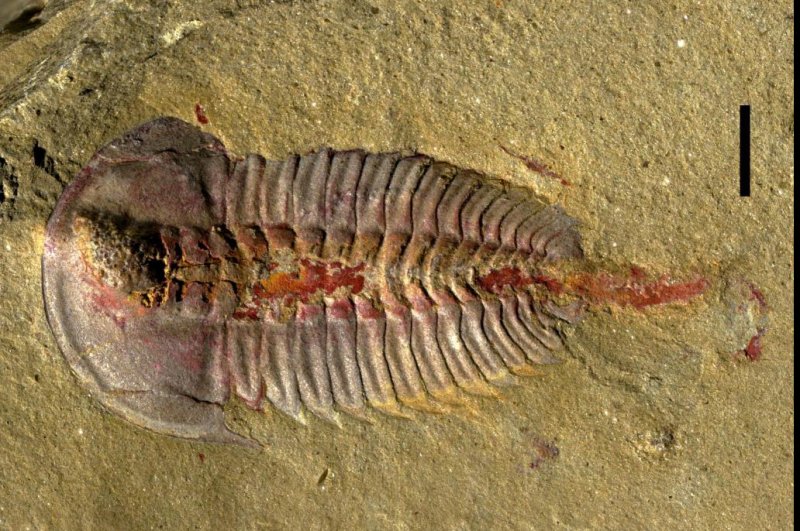Red iron oxide reveals the preserved digestive tract, with an expanded stomach, inside an ancient trilobite found in China. Photo by F. Chen/AMNH
Sept. 21 (UPI) -- Trilobites, the first ubiquitous animal in the fossil record, evolved a stomach more than 500 million years ago. The simple organism's digestive tract was revealed in a new survey of fossil specimens recovered from China.
The findings -- detailed this week in the journal PLOS ONE -- suggest the first animal stomachs evolved 20 million years earlier than previously thought. Researchers identified stomachs among two early trilobite species.
Trilobite exoskeletons were rich in minerals, which is one of the reason why they preserved so well. But even among the most well-preserved fossils, it's rare for soft tissue to survive 500 million years.
"It's very rare to see the preservation of soft tissues like organs or appendages in trilobites, and because of this, our knowledge of the trilobite digestive system comes from a small number of specimens," Melanie Hopkins, an assistant curator in the paleontology division at the American Museum of Natural History, said in a news release. "The new material in this study really expands our understanding."
Trilobites first emerged in the Early Cambrian period and stuck around for some 300 million years, thriving throughout the lower Paleozoic era. The horseshoe crab-like creatures were wiped out by a mass extinction event at the end of the Permian. During their reign, the marine arthropods evolved 20,000 species.
Scientists previously identified an expanded stomach, called a "crop," among later trilobite species. Until now, researchers though early trilobites had only a simple digestive tube -- no crop.
But among the 270 specimens recovered from a quarry in China's southern Yunnan Province, researchers found evidence of an expanded stomach -- proof the earliest stomach emerged roughly 514 million years ago.
"This is a very rigorous study based on multiple specimens, and it shows that we should start thinking about this aspect of trilobite biology and evolution in a different way," Hopkins said.















